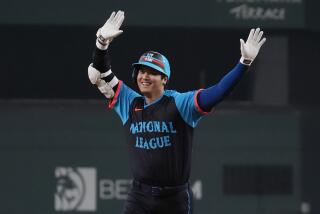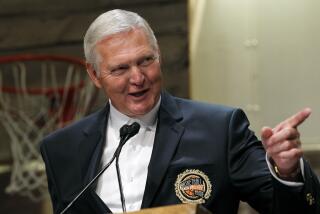NFL Just Says No to Rams’ Sporting Anti-Drug Patch
- Share via
Despite a series of gentle Rams protests, the National Football League has prohibited the team from wearing jerseys featuring a small patch that reads: “Drug Use Is Life Abuse.”
The patches, which made their debut on Rams jerseys during last year’s Oct. 23 game against the Seattle Seahawks at Anaheim Stadium, were the idea of Orange County Sheriff-Coroner Brad Gates. Gates then enlisted the help of Rams owner Georgia Frontiere, who had the slogans sewn on every Rams uniform.
But unlike several other NFL teams that have added patches to their playing attire in past years, the Rams failed to ask or even inform the league of their plans. The result was predictable: The NFL sacked the patch.
Jim Heffernan, NFL director of public relations, said Wednesday that the Rams were reminded last year of league policy concerning the use of such uniform patches, even ones with noble messages. And two weeks before the start of the 1989 Rams exhibition season, the NFL again expressed its dis pleasure with the patches and told the team to remove them from the jerseys.
According to NFL rules, a player is prohibited from wearing or displaying equipment, apparel or other items that carry commercial names, names of organizations other than the player’s team, or personal messages of any type.
The Pittsburgh Steelers wear a patch in memory of their late owner, Art Rooney, and the Chicago Bears wear the initials “GSH” on their uniforms, in honor of their late owner, George S. Halas. A league official indicated that both teams petitioned the NFL for approval to use those emblems, which honor two of the NFL’s founding fathers.
Rams team officials readily admit that they didn’t tell the NFL about the patches last year. But then again, they said they saw no reason to.
“We felt that it was really in compliance with the league’s drug policy. . . . We just felt it was something that should be done,” said Marshall Klein, Rams vice president for media and community relations. “It’s not a commercial message, any more than you would say, ‘God bless America.’ I mean, nobody has to check before they do the national anthem.”
Klein said Frontiere was “disappointed” by the NFL’s decision but that the organization would abide by the rule and had no plans to appeal the decision. And while Klein said the Rams understood the league’s motives for creating the rule, he suggested that perhaps the NFL had missed the point of the patches.
“If it is a commercial message, it’s a message of the highest priority,” Klein said. “If it dissuaded one young man or young girl from doing drugs, it was worth the whole year.
“We would have thought that the league would have let it continue.”
Gates could not be reached Wednesday for comment about the league’s decision.
The patches, according to the Orange County Student Advisory Council Against Drug Abuse, are worn by more than 50,000 high school athletes. Plans call for an additional 80,000 patches to be distributed to elementary school athletes.
In a letter sent to NFL Commissioner Pete Rozelle, the council criticized the league’s decision, asking why “such a successful and mutually beneficial program would be terminated.”
Heffernan, while supporting the sentiment of the patches, said the ruling is final. Klein reluctantly agreed.
“We saw no downside,” Klein said. “But the league, in its opinion, feels the uniform is no place for special interests.”


